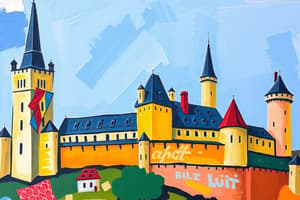Podcast
Questions and Answers
Which of the following figures was NOT a major leader during the Renaissance?
Which of the following figures was NOT a major leader during the Renaissance?
- Michelangelo
- Elizabeth I
- Henry VIII
- Louis XIV (correct)
The Enlightenment Movement primarily focused on the rediscovery of classical texts.
The Enlightenment Movement primarily focused on the rediscovery of classical texts.
False (B)
What was one major impact of the Industrial Revolution on social class structures?
What was one major impact of the Industrial Revolution on social class structures?
It led to the rise of the working class and a decline of traditional agrarian class structures.
The __________ Wars were conflicts that marked the beginning of significant foreign intervention in China by Western powers.
The __________ Wars were conflicts that marked the beginning of significant foreign intervention in China by Western powers.
Match the following leaders with their specific contributions or significance:
Match the following leaders with their specific contributions or significance:
What was the primary economic system associated with early capitalism during the Renaissance?
What was the primary economic system associated with early capitalism during the Renaissance?
The Congress of Vienna aimed at restoring the political order in Europe after Napoleon's defeat.
The Congress of Vienna aimed at restoring the political order in Europe after Napoleon's defeat.
The __________ Restoration in Japan marked a period of rapid industrialization and modernization in the country.
The __________ Restoration in Japan marked a period of rapid industrialization and modernization in the country.
Flashcards
Capitalism
Capitalism
An economic system where private individuals own and control the means of production, with the goal of profit.
Mercantilism
Mercantilism
A political and economic theory that emphasizes the accumulation of wealth and power through trade and colonialism.
Divine Right of Kings
Divine Right of Kings
The belief that a ruler's authority comes directly from God.
Enlightenment
Enlightenment
Signup and view all the flashcards
Absolutism
Absolutism
Signup and view all the flashcards
Nationalism
Nationalism
Signup and view all the flashcards
Industrial Revolution
Industrial Revolution
Signup and view all the flashcards
European Geography before WWI
European Geography before WWI
Signup and view all the flashcards
Study Notes
The Renaissance (1500s)
- European Society: Class structure, worldview, and concept of self.
- Rise of Capitalism: Influence of the Americas, emergence of global powers, and mercantilism.
- Key Figures: Six significant individuals marking the Renaissance.
- Monarchs: Exploration of Henry VIII and Elizabeth I's roles.
Absolutism and the Enlightenment
- Absolutism (Louis XIV): Divine right, power control, standing armies, impacting Europe.
- Enlightenment: Definition, origins, key figures, and ideas.
- French Social Classes: The three estates, their roles, and the impact of Enlightenment thought.
- French Revolution Roots: Louis XVI, societal class issues, and external pressures.
French Revolution/Napoleon
- Revolution Overview: Louis XVI's downfall, Robespierre's rise and fall, Napoleon's prominence.
- Nationalism: Influence of French ideals during Revolution and impact on European politics.
- Napoleon's Rule: Rise to power, military campaigns, and impacts on French society.
- Continental System: Napoleon's foreign policy to isolate Britain.
- Congress of Vienna: Goals, France's post-Napoleonic fate, and the return to a balance of power.
Industrial Revolution and Nationalism
- Industrial Revolution: Definition, origins, impact on manufacturing and society.
- Impact on Society: Changes in class structure and political ideologies.
- Britain's Role: Imperialism, trade, and its position in international relations.
- Nationalism: Unification of Germany and Italy.
- Science/Literature: Important developments in science (Darwin, Marx), literature (Romanticism, Dickens) throughout this period.
The Russian Revolution
- Pre-Revolution Russia: Economic state, leadership, and position in Europe.
- Nicholas II's Reign: Impact of previous czars, Russo-Japanese War, Rasputin, WWI involvement.
- Revolution: Impact of WWI, Lenin's leadership, and international relations.
China, Japan, and Imperialist Forces
- British-Chinese Relations (17th-18th Centuries): Overview of interactions.
- China (17th-18th Centuries): State, population, and power.
- Opium Wars: Causes, impact, and consequences.
- Gunboat Diplomacy: Forced opening of trade with Japan.
- Meiji Restoration: Japan’s industrialization and modernization.
- Japanese Imperialism: Expansionist policies in the late 19th and early 20th centuries.
WWI
- Germany and Versailles Treaty: Conditions imposed on Germany.
- European Geography: Before and after WWI changes.
Studying That Suits You
Use AI to generate personalized quizzes and flashcards to suit your learning preferences.




